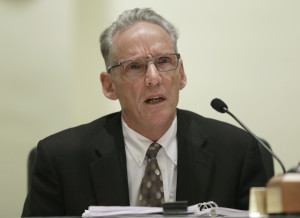Corrections director, attorney reinterpreted law to cut NE prisoners’ sentences

By Deena Winter | Nebraska Watchdog
LINCOLN, Neb. — Corrections employees told a Nebraska State Patrol investigator the former corrections director and his top attorney began granting parolees “good time” — or a reduction in their sentence — even after their parole had been revoked, in an effort to deal with the burgeoning prison population.
ATTORNEY: Corrections employees told investigators former lead corrections attorney George Green OKd a change that gave parolees who had their parole revoked to continue to get “good time” and get released sooner.
Kyle Poppert, records administrator for the corrections department, told Lt. Robert Frank of the State Patrol that when prison officials were looking at legislation that would give prisoners more good time, he suggested giving inmates all of the good time they earned while on parole, even if their parole was revoked. Parolees’ sentences are docked by 10 days per month if they don’t violate their parole conditions, but if their parole is revoked, they lose that good time.
Poppert said he suggested they seek legislation to change that, so the inmates would get out earlier.
“And George Green said, ‘Well, we can interpret this another way and we can let ’em keep that’ and so that was discussed with the director and everything at the time and we made the decision to change,” Poppert told the investigator.
The director at the time would’ve been Bob Houston; Mike Kenney replaced him last year. Green is the former lead counsel for corrections. He resigned his position this summer rather than be fired.
Poppert’s statement to the State Patrol is part of a thick binder of investigatory materials released by Attorney General Jon Bruning on Monday after he announced no criminal charges would be filed in connection with a prison sentencing miscalculation scandal.
In June, news broke that the corrections department had been incorrectly calculating prison sentences for hundreds of inmates with mandatory minimum sentences since 1995. In the wake of the scandal, Kenney put out a memo to employees asking them to come forward with any other potentially embarrassing information.
That’s why Poppert said he brought the parole good time change to Kenney’s attention. The following month, Green asked the attorney general’s office for an opinion on the parole good time, and Attorney General Jon Bruning issued an Aug. 7 opinion that said parolees cannot have their sentences reduced by the good time they earned while on parole.
In light of Bruning’s opinion, the corrections department quietly reversed its practice, adjusting the sentences of about 425 inmates and about 80 parolees and reviewing about 800 people who had already been released from custody. The mistaken sentence reductions ranged from one day to six months.
When the Omaha World-Herald began asking questions about parolees in October, the corrections department issued a rare Saturday press release in which Kenney said, “we have proactively sought out and found an additional area of miscalculation and have been working with the attorney general to correct those errors since last summer.”
While many corrections employees have said the prison sentence miscalculations scandal wasn’t driven by prison crowding, Poppert told the patrol investigator there was pressure to reduce the population legally.
“I do believe that there were too many times that we were looking at things that we could maybe defend, rather than what the letter of the law was,” he told the investigator. “And you know, just like parole good time, we believe(d) we could defend that argument.”
During his own interview with Frank, Kenney mentioned the parole good time change, but said he didn’t think Green interpreted the statute and it wasn’t related to prison crowding.
A records manager, Angeloa Folts-Oberle, also told the investigator she felt the parole good time change was made to keep the prison numbers down. She corroborated Poppert’s contention that he ran the idea by Houston.
“So what they decided to do, and I know this was due to overcrowding, was well, even though they’re revoked, we’re gonna go ahead and give ’em parole credit for the time they were out,” she told Frank.
Folts-Oberle said she knew it was due to prison crowding because a memo talked about how many inmates’ release dates would be affected by the good time credit. She said she heard rumors the governor was pressuring the corrections director to get the population down.
“That was something all of us disagreed with because we did not think that that was what the law intended, but when your legal team reviews it, your director OKs it, you know, you move and you give everybody the parole,” Folts-Oberle said. “I don’t know if this parole good time was something that we thought we could manipulate to try to get guys out sooner.”
Follow Deena on Twitter at @DeenaNEWatchdog
Editor’s note: to subscribe to News Updates from Nebraska Watchdog at no cost, click here.







